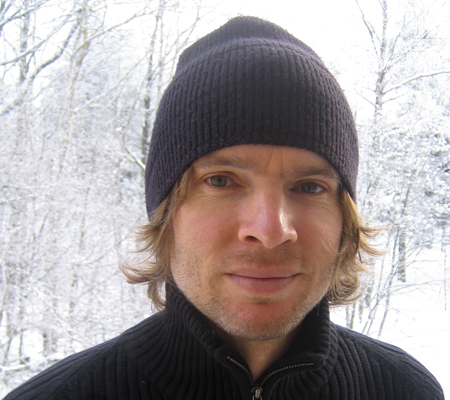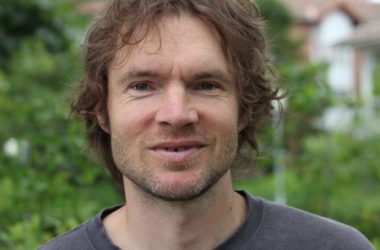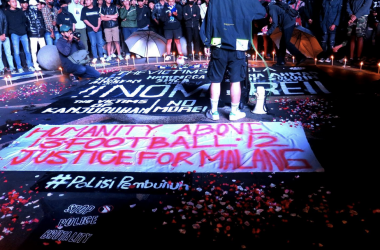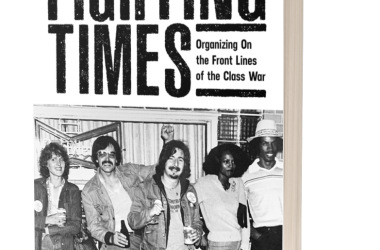By Matthew Rothschild
The Progressive
February 19, 2010
The anarchist author Gabriel Kuhn was planning on visiting the United States in early March and staying until May. He had speaking engagements set up at several colleges, bookstores, and coffeehouses. But he’s no longer coming.
Kuhn, who was born in Austria and lives in Sweden, wrote a prize-winning book on contemporary anarchism in the United States. And he’s the author of two new books published by PM Press out of Oakland. One is called “Life Under the Jolly Roger: Reflections on Golden Age Piracy,” and the other is “Sober Living for the Revolution: Hardcore Punk, Straight Edge, and Radical Politics.”
He applied through Homeland Security’s Electronic System for Travel Authorization, which has been in place for a little more than a year. This system is for people who are traveling to the United States from countries where the U.S. used to say you didn’t need a visa to come to America.
(For a list of those countries, click here.)
Now you need to have either a visa or approval from the Electronic System for Travel Authorization.
So Kuhn, who has come to the United States several times before, logged onto the Homeland Security website and tried to get the travel authorization.
“I considered the process a mere formality,” he wrote in his own account of what happened.
“When the words ‘Travel Not Authorized’ appeared on my computer screen, I instantly thought [it was] a mistake. Certainly I must have missed a letter or digit in my application form. I checked the records. I hadn’t missed anything. Nonetheless, I applied again. It took only a few hours to receive another rejection.”
Joanne Ferreira, a press officer at U.S. Customs and Border Protection, said she couldn’t comment on Kuhn’s specific case, but she said people are rejected for a variety of reasons.
“It could be criminal activity, or an immigration violation, or anything in his past,” she said. She added that people denied travel authorization could then apply for a visa.
Kuhn, who believes he’s landed on the No Fly List, understood he had that option but concluded it was unlikely he would be granted a visa, and if he did get it, he was worried he’d be turned away once he got here.
“Under these circumstances, it became impossible for me to continue planning my tour (which was to start in a month), and I had to cancel.”
Kuhn, who got a PhD in philosophy from the University of Innsbruck, tells me there is a lot of “official hype” about freedom of speech in America, but it’s not a reality here. Nor is the freedom to listen.
“This is what authorities try to undermine by keeping folks with ‘suspicious’ views from visiting the country,” he tells me. “This is nothing new. If we use anarchist history as an example, xenophobia and political oppression have always gone hand in hand. The first strong wave of anarchism in the U.S. between 1870 and 1920 was largely ascribed to immigrant groups (mainly Germans, Italians, and Russians). The ‘anarchist exclusion ban’ was passed by Congress in 1903, and the mass deportation of anarchists without citizenship in 1919 pretty much marked a final blow to the movement.”
Ramsey Kanaan, co-founder and publisher of PM Press, says the rejection of Kuhn’s travel authorization application “seems to represent a turn towards targeting radicals who have hitherto not fit the ‘war on terror’ profile.” He points out that even the Bush Administration, though not without questioning, allowed Kuhn in. “Why is it, under an Obama regime struggling to contain massive economic crisis, that this is no longer the case?”
Several people who set up U.S. venues for Kuhn are furious that he had to cancel.
Lynn Owens is an assistant professor of sociology at Middlebury.
“I was very angry to hear of Gabriel’s exclusion from the U.S. and the subsequent canceling of his tour,” Owens tells me. “I had worked with him to arrange for him to give a talk at my school, excited to be able to squeeze a small amount of funds to bring in a speaker to campus who was outside the normal range of who normally comes, to expose the students (as well as, hopefully, members of the broader community) to new and less common political ideas and experiences. I am mad not only because we lost a great speaker; I am mad because we are losing the ability to move and act freely in this world, all under the guise of making us ‘safer.’ As someone who studies the role of travel, movement, and border crossings in the construction of social movements and political activism, I can tell you that programs like the unaccountable ‘No Fly List’ will have a serious effect on the possibilities for political action, both across and within borders. This is simply one more step in trying to not only delegitimate opposition, but also to make it increasingly difficult to build and maintain connections between activists.”
Immanuel Ness is a professor of political science at Brooklyn College, CUNY.
“Gabriel Kuhn is a highly recognized international scholar on anarchism who has a large following among students and faculty, perhaps the reason why the government is preventing his book tour,” Ness says. “The U.S. no-fly ban comes at a time when anarchist and socialist ideas are more compelling among college students than ever. We live in Orwellian times.”
Jesse Cohn, an associate professor of English at Purdue North Central, was setting up Kuhn’s Indiana itinerary. He’s worked with Kuhn on translating some of the writings of anarchist Gustav Landauer.
“The way I first got to know Gabriel,” says Cohn, “was through our collaboration on a translation of Landauer’s eloquent denunciation, in the wake of McKinley’s assassination, of ‘the notion that one can reach the ideal of non-violence by violent means’: ‘All violence is either despotism or authority.’ Raise your hand if you think this is an idea Americans need to be protected from! My response, apart from continuing to voice my opposition to such idiotic restrictions of the freedom to travel, will be to do what I can to make sure that Gabriel’s books are read and shared and discussed, that the ideas travel freely where he cannot.”
Evan Scott, a member of the worker-owned Firestorm Café and Books in Asheville, North Carolina, echoes those sentiments.
“Our staff and community were disappointed and outraged to learn that Kuhn would not be able to travel in the United States, where his work is freely read and appreciated,” Scott says. “A year into the Obama presidency, this was a stark reminder that the federal government continues to exploit the fear of terrorism to restrict domestic political dissent.”
For his part, Kuhn says a lot of European dissidents don’t want to even try to visit the United States because it’s such a hassle.
“Especially since the mandatory fingerprinting and iris scan was introduced a few years back, many refuse to travel on principle,” he says. “There already exists a pretty strong ‘vulgar anti-Americanism’ among many left-leaning or radical folks, intellectuals included. I call it ‘vulgar’ because it’s based on stereotypes about the U.S. being nothing but a mixture of Hollywood, McDonalds, and Christian fundamentalism. Folks like me, who have spent a lot of time in the country and know that this is not true, have been trying long to correct these stereotypes.”
But given his latest experience, and that of others, he says, “It gets harder and harder to change people’s opinions.”
More blogs from Gabriel | Back to Gabriel Kuhn’s Author Page





